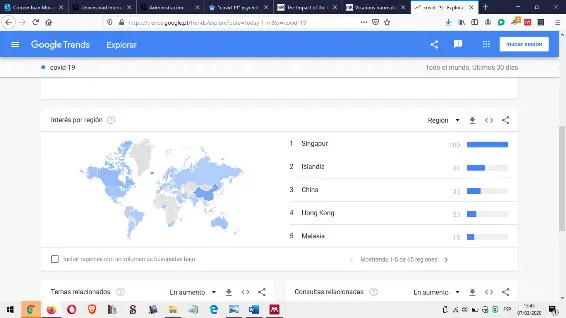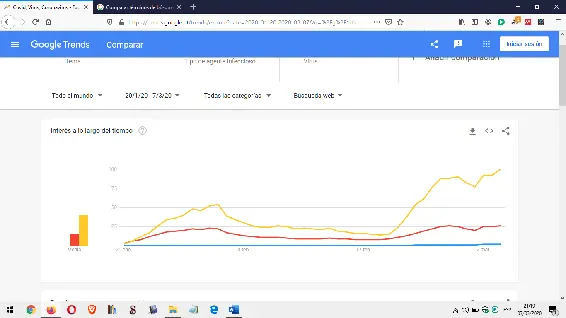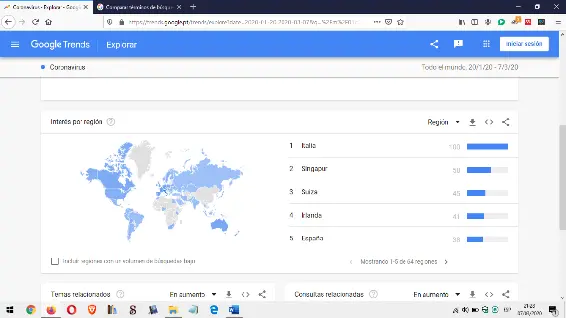Illustration 4. Evolution of the search term
Regarding interest shown by specific countries, it can be seen that the country that has generated most searches within the last month has been Singapore, followed by Iceland, China and Hong Kong. Out of the total 65 countries in Google’s results, USA is in 20th position and Spain is 48 th. Turkey is in final position (See Illustration 5).
As can be seen, there is no direct correspondence between the countries with the greatest number of cases and the concern generated amongst their populations reflected in the searches. This may be due to other factors, such as the generation of alarmism in certain populations for instance, or usage of means other than Google to obtain pertinent information. For example, in some Asian  countries the most commonly used search engine is Baidu.
countries the most commonly used search engine is Baidu.
Illustration 5. Searches by country
It should also be noted that COVID-19 was previously referred to as the new coronavirus 2019 (n-CoV) and also known as “China virus” or “Wuhan virus” – Wuhan being the name of the Chinese province where the virus originated, so some users will continue to search with these old terms. In addition, the term ‘coronavirus’, which is the name of the family of this particular virus, or simply ‘virus’ may be used. For this reason, if data is only collected for the term ‘COVID-19’ the overview would be incomplete. This could explain the difference demonstrated between countries in terms of number of deaths and order of interest shown from Google searches.
Therefore, if the previous search is carried out, but including the terms COVID, Virus and Coronavirus as search terms, it can be seen that concern for this issue began on 20 thJanuary 2020, and that the term COVID or COVID-19, which is its official name, is hardly used at all in information searches on the subject, with the search of the term Virus being considerably higher and the term  Coronavirus higher still (See Illustration 6).
Coronavirus higher still (See Illustration 6).
Illustration 6. Terms on Google related to COVID
In the previous graph one can see there was initial interest shown in both terms Virus and Coronavirus between 20 thand 31 stJanuary followed by a progressive loss of interest up until 20 thFebruary when interest in the term Coronavirus increases exponentially.
Focussing on this last term, the country that has searched it the most on Google is Italy, followed by Singapore and Switzerland. Out of the 64 countries for which data is available Spain is in fifth place and USA is nineteenth (See Illustration 7).
This data does correspond to the growing number of infections, except in the case of Ireland where one could speak of an instance of social alarmism over actual data of the time.
 Illustration 7. Search of the term Coronavirus by country
Illustration 7. Search of the term Coronavirus by country
One of the problems facing social psychologists is in achieving customer brand loyalty, a brand being that which is used in the identification of a certain person, product or company. Normally when thinking of a company like Coca-Cola, McDonald’s or IKEA, it is with reference to the products they sell. With other brands such as UPS, Iberia or Microsoft, it is with regards the services they offer. This is something which exerts a decisive influence on the purchase of any product or service, which is no longer based just on one’s own judgement, but on the influence of the opinion of others and the media via advertising.
If one thinks of Stephen Hawking, Barack Obama or Rafael Nadal in the same way, it is no longer in terms of products or services, but in respect of their personal branding or brand they have developed through their scientific, political and sporting careers respectively. In other words, emotional aspects become associated with a brand which may be linked to a person, a company and even a place.
The same happens when it comes to the naming of disasters, as in the case of the tropical cyclones which annually afflict a large part of the Caribbean and North America. According to the World Meteorological Organization (WMO, 2020) these names follow pre-established rotating lists, and for many they leave behind the memories of the effects of Hurricane Katrina in 2005 or Ike in 2008.
In principle the names bear no relation to the dates of the events, the damaging incidents themselves, or the most affected areas. Amongst them are English and Spanish names e.g. Barry, Gonzalo and they may be male or female e.g. Lorenzo, Laura. But does the name of a tropical cyclone have any impact upon the population?
An answer to this question has been sought by the Department of Administration and Business in conjunction with the Department of Psychology, the Institute of Communications Research, and the Women and Gender Surveys Research Laboratory of the University of Illinois; together with the Department of Statistics of Arizona State University (Jung, Shavitt, Viswanathan & Hilbe, 2014).
The study analysed the climatic consequences of hurricanes in the USA over the last six decades, differentiating between those with male and female names. The first finding was that those with female names had been the most destructive and the cause of most deaths.
It should be remembered that the list of names is preassigned and their assignment organised consecutively, so a priori there is no relationship between the gender of the name and the intensity of the hurricane. A list of hurricane names, 5 male and 5 female were given to 346 participants for them to rate the considered extent of each hurricane’s intensity on a Likert-type scale from 1 – 7. The results showed that male-named hurricanes tend to be evaluated as more destructive than female-named hurricanes, regardless of each participant’s gender.
This study made it possible to understand why, in the face of warnings from the authorities, sometimes more and sometimes fewer preventative measures tend to be taken. It is, in fact, simply due to whether the hurricane’s assigned name is male or female.
In contrast, the designation of diseases within the health field are usually indicated by an acronym which relates to certain identifying characteristics of its location, symptoms or consequences.
There have previously been several outbreaks of the coronavirus strain, as in the case of SARS-CoV which emerged in China in 2002 and whose acronym corresponds to Severe Acute Respiratory Syndrome, referring to its symptomology. The MERS-CoV virus emerged in Saudi Arabia in 2012 and its initials refer to the Middle East Respiratory Syndrome Coronavirus, describing both its location and symptoms. The acronym for COVID-19, which emerged in China in 2019, refers to the Coronavirus disease of 2019, with no indication as to its symptoms or source.
It should be noted that COVID-19 was not the first name to be used in the identification of this disease, but it was a term introduced almost two months after the first case was reported to the WHO. This has led some to argue that the motivations for changing and assigning it an ‘official’ name, were done to avoid the negative consequences of associating a type of disease with a region or population (@radioskyl,2020) (See Illustration 8).
The aim here would be to eliminate the names of ‘China virus’ or ‘Wuhan virus’, terms which point directly to the source of the infection. Some health professionals denounce this deference towards China, since the same consideration has not been shown towards other populations, as in the case of the Middle East Respiratory Syndrome Coronavirus, for instance.
Читать дальше

 countries the most commonly used search engine is Baidu.
countries the most commonly used search engine is Baidu. Coronavirus higher still (See Illustration 6).
Coronavirus higher still (See Illustration 6). Illustration 7. Search of the term Coronavirus by country
Illustration 7. Search of the term Coronavirus by country










